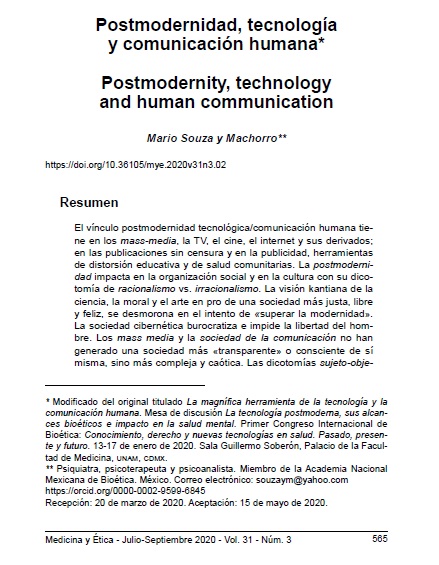Postmodernity, technology and human communication
Main Article Content
Abstract
The link postmodern technology/human communication has in mass media, TV, cinema, the internet and its derivatives, uncensored publications and advertising tools of educational distortion and community health. Postmodernity influences social organization and culture with its dichotomy rationalism vs. irrationalism. The Kantian vision of science, morality and art for a fairer, freer and happier society crumble in the attempt to «overcome modernity ». Cybernetic society bureaucratizes and impedes man’s freedom. Mass media and the communication society have not generated a more transparent or self-aware society, but more complex and chaotic. Subject-object and public-private dichotomies make the individual oblivious to his life, an element of science fiction, immersed in a virtual process that displaces him to electronic worlds. In the ecstasy of communication, the medium
predominates with its dispersion over the message, scientific knowledge is oriented to technological development and power, highlighting its linguistic aspect that does not prevent more and more from being talked about and written worse. The impact of mass media drives antisocial behaviours and «the search for intense sensations» to placate emotional states stemming from the existential vacuum, frustration and vital dissatisfaction of certain populations. The persistence of alienating, self-aware and realitydistorting disclosure does not encourage the development of a healthy personal, linking and social function.
Downloads
PLUMX Metrics
Article Details
Medicina y Ética is distributed under a Creative Commons License Atribución-NoComercial-CompartirIgual 4.0 Internacional.
The author keeps the property rights with no restriction whatsoever and guarantees the magazine the right to be the first publication of the work. The author is free to deposit the published version in any other medium, such as an institutional archive or on his own website.
References
2 MATTIAS, B., GRETCHEN, R., BLYKER, M., POTENZA, N. When pornography becomes a problem. Clinical insights. Psychiatric Times. 2019; Dec. 13, vol. 36, issue 12.
3 GÓMEZ SÁNCHEZ, LUIS EDUARDO. Desconstrucción o nuevas síntesis. Aproximaciones críticas a la noción de postmodernidad. En: Imágenes desconocidas. La modernidad en la encrucijada postmoderna. CLACSO; 1988.
4 FOSTER, HAL, ET AL. La postmodernidad. Barcelona: Kairós; 1988.
5 HABERMAS, J. El discurso filosófico de la modernidad. Madrid: Taurus; 1989.
6 LECHNER, NORBERT. Un desencanto llamado postmodero. En: Imágenes Desconocidas. La modernidad en la encrucijada postmoderna. CLACSO; 1988.
7 HOPENHAYN, MARTIN. El debate postmoderno y la dimensión cultural del desarrollo (un esquema descriptivo). En: Imágenes Desconocidas. La modernidad en la encrucijada postmoderna. CLACSO; 1990.
8 JAMESON, FREDERIC. Postmoderismo y sociedad de consumo. En: FOSTER, HALET AL, La postmodernidad. Barcelona: Kairós; 1988.
9 VATTIMO, GIANNI. El fin de la modernidad; nihilismo y hermenéutica en la cultura postmoderna. España: Gedisa; 1986. https://doi.org/10.2307/j.ctvf3w4sh.19
10 LYOTARD, JEAN-FRANÇOIS. La condición postmoderna. Informe sobre el saber Cátedra, Col. Teorema: Madrid; 1984.
11 LYOTARD, JEAN-FRANÇOIS. La postmodernidad (explicada a los niños). México: Gedisa Mexicana; 1990.
12 VATTIMO, GIANNI. La sociedad transparente. Paidós/ICE-UAB, Colección Pensamiento contemporáneo; 1990, 10.
13 BARROSO GÓMEZ, J. Medios de comunicación y postmodernidad. Hacia una prensa ética, comunitaria y planetaria. Razón y palabra. Deporte, cultura y comunicación. Número 69: 2-10.
14 SOUZA Y MACHORRO, M. Mass media y psicopatología; violencia sexo y drogas. Revista electrónica de Medicina Neuropsicológica. 2012, enero; 13: 519-526.
15 WATZLAWICK, PAUL. Teoría de la comunicación humana: interacciones, patología y paradojas. Herder: Palo Alto, California; 1967. https://doi.org/10.2307/j.ctvt9k0tj
16 SOUZA Y MACHORRO, M. Violencia social y familiar en el Perú actual. Hospital Hermilo Valdizán. Oficina de Apoyo a la Docencia e Investigación. Auditorio Farmindustria: Lima, Perú; 2012, mayo; 29-30.

